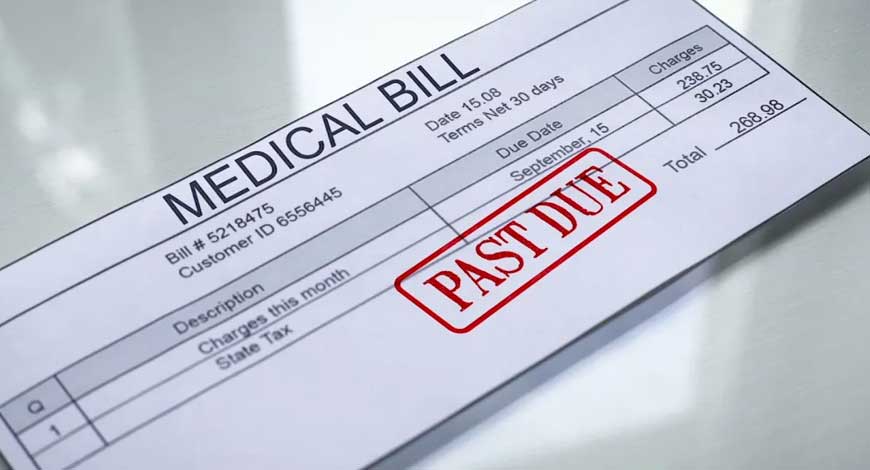International Circuit
Bill passed to prevent reporting Connecticut residents’ medical debts

The House of Representatives passed a bill that would prevent Connecticut residents’ medical debts from being reported to credit agencies.
“More than 40 percent of adults in America are carrying medical debt that they can’t pay,” said Rep. Jillian Gilcrhist (D-West Hartford), Co-Chair of the Human Services Committee. “As a result, individuals have been financially burdened and they experience the inability to secure loans for such things as mortgages, rents, and car loans.”
The bill prohibits Connecticut healthcare providers, hospitals and other entities owned by or affiliated with hospitals, from reporting medical debts to credit rating agencies, preventing medical debts from negatively impacting residents’ credit scores. The bill defines medical debt as any bill required for received health care goods and services, including elective surgeries. It would exclude medical debts charged to credit cards unless they are credit cards specifically offered by insurance providers to pay for healthcare-related goods and services.
If signed by the governor, the bill would go into effect on July 1, 2024. It would not be a retroactive bill, meaning that Connecticut state residents who have already incurred damages to their credit reports due to unpaid medical debt would not have this damage revoked.
If passed, the bill could represent another significant benefit to Connecticut residents who are straddled with medical debt. Earlier this year, Governor Ned Lamont announced a budget proposal that could remove up to $2 billion worth of state residents’ medical debt. In the Governor’s press release announcing this proposal, it is estimated that two-thirds of personal bankruptcies occur as a result of medical debt.
The bill originated in the Senate, where it was co-sponsored by Senators Martin Looney (D- New Haven), Matthew Lesser (D-Cromwell ), and Saud Anwar (D- East Hartford). It passed in the Senate on April 18, with a vote of 27-9.
Support for the bill was split down party lines; while Democrat representatives thought it would be an effective way to alleviate the fiscal burden of residents encumbered by medical debt, Republican representatives criticized its inclusion of elective surgeries, questioned which credit cards would qualify as “healthcare related,” and feared that significant increases in unpaid debt could lead to the state having to intervene to the detriment of taxpayers in the future.
Representatives Jay Case (R-Colebrook) and Gale Mastrofrancesco (R-Southington) grilled Gilchrist on the fact that elective surgeries would be included, and asked what would stop people from seeking cosmetic procedures and not paying them off. Mastrofrancesco also questioned how the state would determine which credit cards would be considered as qualifying healthcare related cards.
Rep. Steve Weir (R-Andover) also questioned what would be considered medical debt. He said that under CareCredit, a card that members of the House had previously speculated may fall under the purview of such a credit card that would be exempt from credit reporting, purchases related to weight loss are allowed. He then speculated that it could potentially allow people insured under CareCredit to purchase weight loss equipment, his example being a Peloton bike, not pay it back, and have that debt go unreported and unpaid.
Weir said that allowing for medical debt to go unreported to credit agencies and allowing people with medical debt to take out other loans without these loans’ financiers being aware of the person’s outstanding medical debt was tantamount to fraud.
“It seems to me that it’s going to incentivize fraud, and limit accountability, and that’s eventually going to come back to all of us who do our best to pay our bills,” said Weir.
Rep. Lucy Dathan (D-Norwalk) pushed back against the notion that the bill would lead to debts going unpaid, saying it would not void the debt for those who owe it, just prevent it from being reported. She also said that any credit cards applicable under the bill typically have very strict stipulations regarding what can be purchased with it.
“Peloton might not be qualified to be purchased under this type of credit card,” said Dathan.
She went on to say that elective surgeries are important to include, as many can offer a significant increase to patients’ quality of life. She said that cosmetic surgeries only account for 8 percent of medical debt, and that included surgeries such as cleft palate corrective surgeries, and breast reconstructions for women who have had mastectomies. Furthermore, she said that 20 percent of medical debt is attributed to major joint surgeries, and another 12 percent to eye surgeries, both of which fall under the category of elective procedures.
“I’m really appreciative of this bill, because it does help people maybe take some of the pressure off on their credit reports,” said Dathan. “But at the end of the day, our providers, individuals, are still able to have the recourse to recover money from people who incur medical debt and this bill does not prevent that.”
Republican lawmakers attempted to pass an amendment that would remove the exemption of reporting medical debt for elective procedures. The amendment was shot down by a vote of 98-52. Despite Republicans’ objections, the underlying bill passed by a vote of 106-44. Since it was already passed by the Senate, all it requires is the Governor’s signature to be made law. Connecticut Inside Investigator












